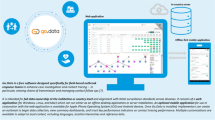Abstract
Various industries worldwide have been severely affected by the COVID-19 pandemic, highlighting the gaps between social systems and forcing major transformations of our lives. To understand and mitigate the phenomena related to the unprecedented danger of COVID-19, we have become acutely aware of the importance of data distribution, exchange, and sharing across fields; indeed, various data are published and used in decision-making processes. However, although many international organizations and companies have been publishing data and adopting relevant measures, data sharing regarding the question of what data are required for any purpose is insufficient; that is, data are principally provided by organizations who publish the data unilaterally; currently, data-related needs are not shared or leveraged. To address this issue, we introduce the concept of “data origination.” Data origination is the act of designing/acquiring/utilizing data that considers the subjective knowledge and diversity of perspectives of humans, and that aims to elucidate and support this process. We also discuss a case study of data needs and unexplored data externalization conducted during the COVID-19 pandemic, based on data origination.
Access this chapter
Tax calculation will be finalised at checkout
Purchases are for personal use only
Similar content being viewed by others
Notes
- 1.
- 2.
In this model, a mechanism is studied where knowledge further reinforces perceptual and conceptual filters, and influences the world as actions; however, a detailed discussion is omitted in this article.
- 3.
Naturally, there is potential for human interpretation in the process where information is obtained from data, and the relevant analytical tools must be selected with care.
- 4.
- 5.
References
(2020) Person-to-object contact dataset: actual conditions of contact behaviors with objects during the covid-19 pandemic. https://www.kaggle.com/teruakihayashi/person-to-object-contact-dataset
Beyer, L., Hénaff, O.J., Kolesnikov, A., et al.: Are we done with imagenet? (2020). arXiv:2006.07159
Black, J.S., van Esch, P.: Ai-enabled recruiting: what is it and how should a manager use it? Bus. Horiz. 63(2), 215–226 (2020)
Boisot, M., Canals, A.: Data, information and knowledge: have we got it right? J. Evol. Econ. 14(1), 43–67 (2004)
Chui, M., Manyika, J., Miremadi, M., et al.: Notes from the AI Frontier: Applications and Value of Deep Learning. McKinsey Global Institute, London (2018)
Guo, Z.D., Wang, Z.Y., Zhang, S.F., et al.: Aerosol and surface distribution of severe acute respiratory syndrome coronavirus 2 in hospital wards, Wuhan, China. Emerg. Infect. Dis. 26(7), 1586 (2020)
Hand, D.J.: Dark Data: Why What You Don’t Know Matters. Princeton University Press, Princeton (2020)
Harvey, A.P., Fuhrmeister, E.R., Cantrell, M.E., et al.: Longitudinal monitoring of SARS-COV-2 RNA on high-touch surfaces in a community setting. Environ. Sci. Technol. Lett. 8(2), 168–175 (2020)
Hayashi, T., Ohsawa, Y.: Variable quest: network visualization of variable labels unifying co-occurrence graphs. In: 2017 IEEE International Conference on Data Mining Workshops (ICDMW), pp. 577–583. IEEE (2017)
Hayashi, T., Ohsawa, Y.: Inferring variable labels using outlines of data in data jackets by considering similarity and co-occurrence. Int. J. Data Sci. Anal. 6(4), 351–361 (2018)
Hayashi, T., Ohsawa, Y.: Data origination: human-centered approach for design, acquisition, and utilization of data. In: International Conference on Soft Computing and Pattern Recognition, pp. 85–93. Springer, Berlin (2020a)
Hayashi, T., Ohsawa, Y.: Teeda: an interactive platform for matching data providers and users in the data marketplace. Information 11(4), 218 (2020)
Hayashi, T., Uehara, N., Hase, D., et al.: Data requests and scenarios for data design of unobserved events in corona-related confusion using teeda. In: 2020 IEEE International Conference on Big Data (Big Data), pp. 4456–4461. IEEE (2020)
Hayashi, T., Hase, D., Suenaga, H., et al.: The actual conditions of person-to-object contact and a proposal for prevention measures during the covid-19 pandemic (2021). medRxiv
Liang, F., Yu, W., An, D., et al.: A survey on big data market: pricing, trading and protection. IEEE Access 6, 15,132–15,154 (2018)
Manyika, J., Chui, M., Brown, B., et al.: Big data: the next frontier for innovation, competition, and productivity. McKinsey Global Institute (2011)
Ong, S.W.X., Tan, Y.K., Chia, P.Y., et al.: Air, surface environmental, and personal protective equipment contamination by severe acute respiratory syndrome coronavirus 2 (sars-cov-2) from a symptomatic patient. JAMA 323(16), 1610–1612 (2020)
Riddell, S., Goldie, S., Hill, A., et al.: The effect of temperature on persistence of SARS-CoV-2 on common surfaces. Virol. J. 17(1), 1–7 (2020)
Stahl, F., Schomm, F., Vossen, G.: Data marketplaces: an emerging species. In: Frontiers in Artificial Intelligence and Applications, pp. 145–158. IOS Press (2014)
Acknowledgements
This study was supported by JSPS KAKENHI (JP19H05577 and JP20H02384), the “Startup Research Program for Post-Corona Society” of Academic Strategy Office, School of Engineering, the University of Tokyo, the “COVID-19 AI and Simulation Project” of the Office for Novel Coronavirus Disease Control, Cabinet Secretariat, Government of Japan, and the MEXT Quantum Leap Flagship Program (MEXT Q-LEAP) under Grant JPMXS0118067246. We thank Editage for providing English language editing.
Author information
Authors and Affiliations
Corresponding author
Editor information
Editors and Affiliations
Rights and permissions
Copyright information
© 2023 Springer Nature Switzerland AG
About this chapter
Cite this chapter
Hayashi, T., Ohsawa, Y. (2023). Externalization of Unexplored Data with Data Origination: Case Analysis of Person-to-Object Contact Data During COVID-19 Pandemic. In: Ohsawa, Y. (eds) Living Beyond Data. Intelligent Systems Reference Library, vol 230. Springer, Cham. https://doi.org/10.1007/978-3-031-11593-6_13
Download citation
DOI: https://doi.org/10.1007/978-3-031-11593-6_13
Published:
Publisher Name: Springer, Cham
Print ISBN: 978-3-031-11592-9
Online ISBN: 978-3-031-11593-6
eBook Packages: Intelligent Technologies and RoboticsIntelligent Technologies and Robotics (R0)




